One of those unexpected, sudden rising to fame stories that happens every so often in the literature wold: this time with Mick Herron’s Slow Horses series. I’ve only watched the Apple TV series so far (which is stellar and on its 4th season), but I’ve got my eye on the books next…
➔ Patrick Rhone has a nice “Rhoneism” today regarding clothes, and remarks specifically:
[...] fashion and the idea of having multiple items of various pieces of clothing is a fairly recent idea history-wise [...]
Nice to see an intersection of this thinking × capsule wardrobe trending, too.
Six Colors' Interview with Zach Gage on Puzzmo and specifically, Pile-up Poker. He’s got an agreeable rationale for why it’s limited to five hands per day, something I’d been curious about since it was launched.
Ingenuity in ’re-agriculture' has led to successfully transitioning out of factory farming into medicinal tinctures, mushroom coffee blends, and solar panel surplus energy. “If all goes well, the profits from mushrooms could exceed what the farm was generating from hogs during the best of times.”
Great new video from coffee guru James Hoffmann covering celebrity coffee products. Few have captured the egotistical rationale (me = “founder”) and business machinations (scaled but mid production) driving this celebrity trend than he does. It’s still all about merchandising recurring revenues.
Kudos to Matt Birchler’s simple declaration about the AeroPress making a phenomenal cup of coffee. I agree that regardless of how skilled you think you are with pour overs or other methods, the AeroPress delivers an impressively consistent cup without much room for error.
A list of some lists, from Field Notes. A quintessential kind of post for the notebook brand, really.
Is there any other state in the US with such a breadth of grocery store non-dominance as Minnesota? Great piece by Adam Platt at MinnPost on the state of affairs. Big Kowalski’s fan, even if it’s only 2% marketshare.
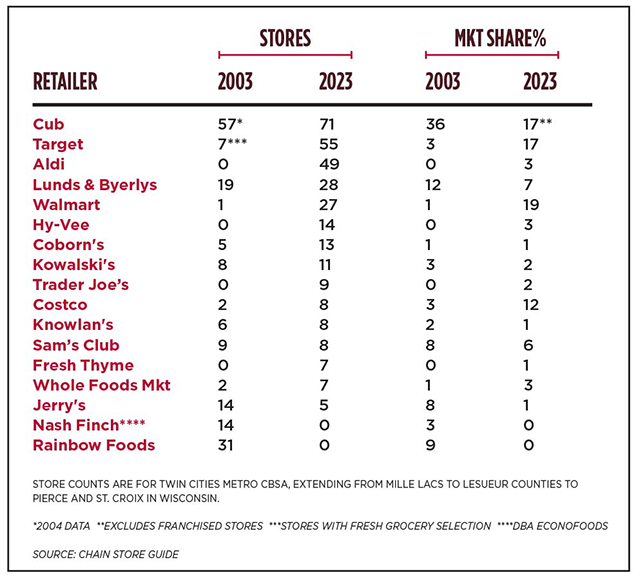
Ambitious collaboration of companies using “luminescent pigments [from FibreTrace’s tech] into raw cotton when ginning”, whereupon “scanning a pigment, it can be tracked throughout the supply chain, identified and verified on-site”. Love to see this supply chain innovation approach.
Kino was released today as a 1.0 — a powerful, fun new video recording app from Lux, the makers of the Halide photography app. Immediate download for me, foremost to just check out their neat intro-to-the-app brochure. Secondly, to record my dog, who just sat there on the couch blinking at me.
Another notch towards disinformation dystopia… Microsoft researchers warn us (as if we weren’t already concerned) about the dissemination of generative AI into video-based platforms. Honestly, video has always been a concerning format for news — it’s prone to visual biases. This doesn’t help.
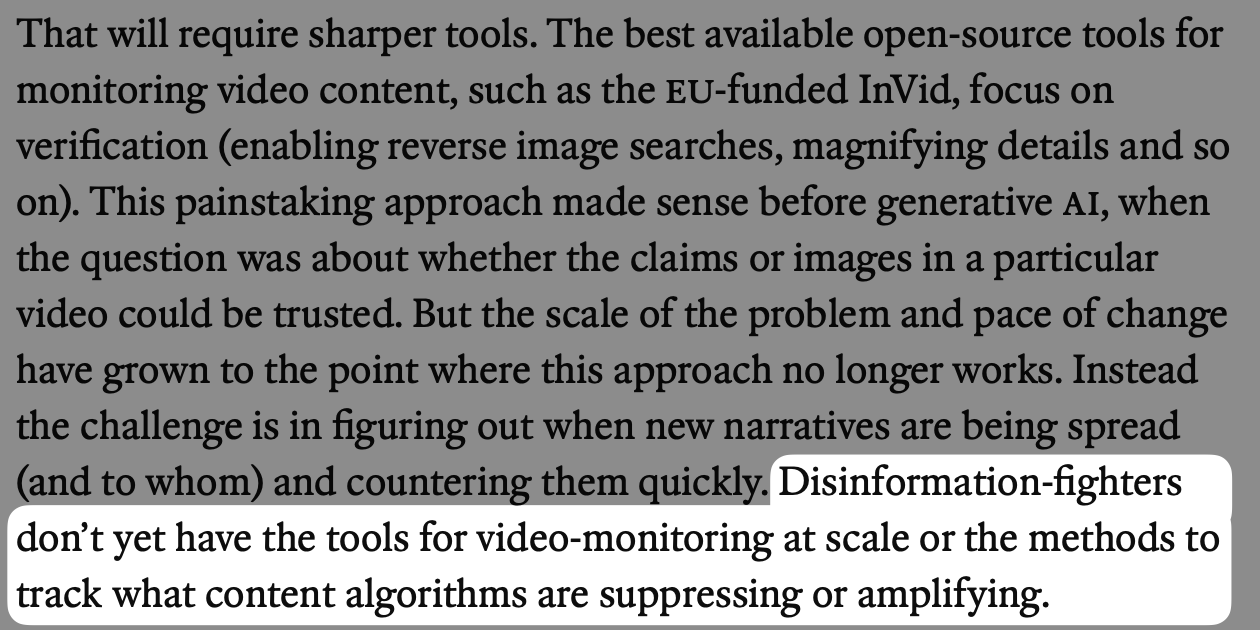
Great piece from Bryan Hansel on unread books:
Unread books are a way to know that we don’t know. It’s being humble. I believe there’s a saying that’s something like this: the more you know, the less you know you know.
Aggregator Review Sites & Hints of Their Degradation
Ben Brooks has a well-appointed linked commentary up for a post by HouseFresh, detailing the bankrupt state of “genuine” product review sites. Ben (and I, for that matter), have been writing product reviews for objects of interest for over a decade, and I definitely can say that there are fewer reliable sources to cross-check and research these days.
I recommend the linked-to HouseFresh post, and then Ben’s remarks. All progressive thoughts on this space.
A few take-aways
- Trust erosion. Can anyone take Wirecutter seriously anymore, post-NYT acquisition? Does anyone trust other sites with heavy brand collaboration, like Carryology, where inherent bias must exist? Or any heavily ad-monetized aggregation site? Like the noted air purifier in HouseFresh’s post that imploded, how is it we can trust products that are recommended or have high customer reviews when the company is peddling a poor product and can’t even sustain itself?
- Broken visibility. There are concerns that actual review sites are surprisingly poorly ranked in search engines (though it’s unsure how large-language models will handle these — I’d hope they respect the good ones).
- Affiliate acquisition. Ben also notes that many “conglomerate type companies have bought out once reputable brands to sell utter shit content”, which is absolutely true. This is affiliate/aggregator site M&A planning 101.
- Review integrity. Review enshittification is certainly happening, and Ben summarizes likely what’s happening in many review industries: “a lot of people will review something after a day, without harming the item, so they can go ahead and return it from where it came and get their money back… they need the money back, it’s expensive, and they need a lot of content to publish on a frequent basis.”
Another concerning trend — 80% more people are tapping their 401(k) accounts than pre-Covid. This, plus record credit card balances, and an unexpected US inflation rise to 3.2% last month, are problematic. What are all the catalysts? This is feeling like the subprime mortgage crisis all over again.
Joan Westenberg wrote an impeccably-tuned condemnation of the injustices of societal engineering inflicted by elites via technological chasms across society. The entire essay is quotable, but here’s the gist of her observations on a roaring discontent across the globe:
That damage is the result of the elite in every sector, in every corner of society who have been content to grind down the general populace for their own selfish — and intractably large — gains. For too long, technology has sat alongside other mechanisms and failures of power, from financial instruments, political lobbying and careerism to wealth hoarding and environmental betrayal. These elements are always interconnected. And it has created a growing chasm between the elite and the general populace.
This clear and pronounced economic divide is a testament to a systemic imbalance that has long been brewing. The ever-widening gulf between the wealthy and the struggling masses is not a matter of numbers on a balance sheet; it shows a tear in the very fabric of our societies. The concentration of wealth and opportunity in the hands of a select minority has not only deepened the chasm between the rich and the poor but has also ignited a simmering sense of injustice and resentment across the broader population.
[Google News] ultimately does not focus on whether a news article was written by an AI or a human
This probably won’t end well.
This Ezra Klein Show episode is stellar — “How to Discover Your Own Taste”. Discussion with Kyle Chayka spans curation, taste, and aesthetics, particularly in the context of the Internet, and as an important resistance against The Algorithm that can deter true individuality.
Transcript link for the readers out there.
The Mobis e-Cornering system on the wheels of this future Ioniq 5 is the dream.

Another great generative AI perspective (this one from John Siracusa) about the coming foibles of creative ownership and the relationship between those creating and those consuming. Very astute approach to thinking towards the right way to frame the big question of “who made this”.
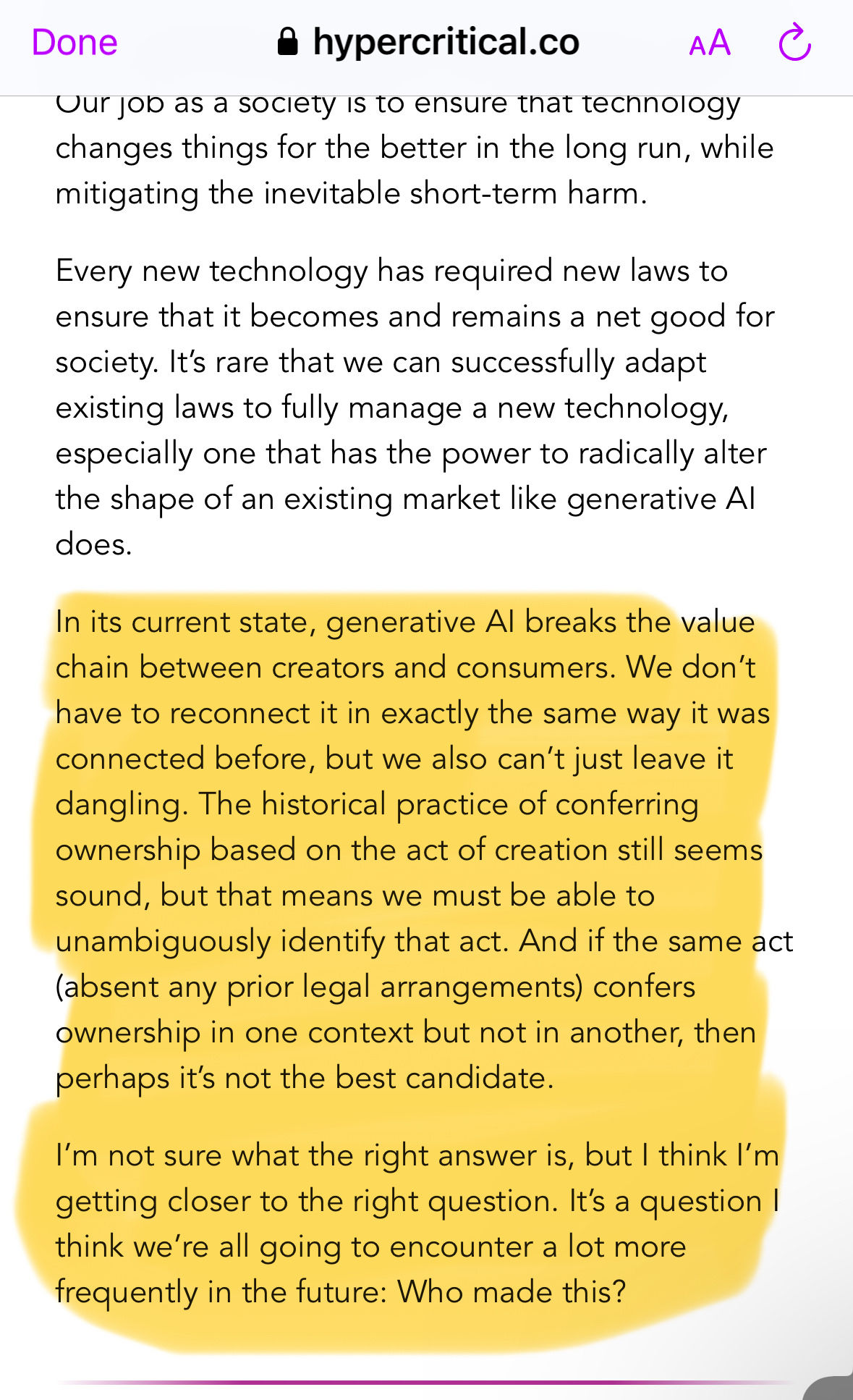
Digging Chuck Wendig’s rant about generative AI and the creative arts, notably that the timing isn’t right yet for relying heavily on it (at all).
I think there is a use case for streamlining creative (in marketing, et al), but only to assist, never to replace.
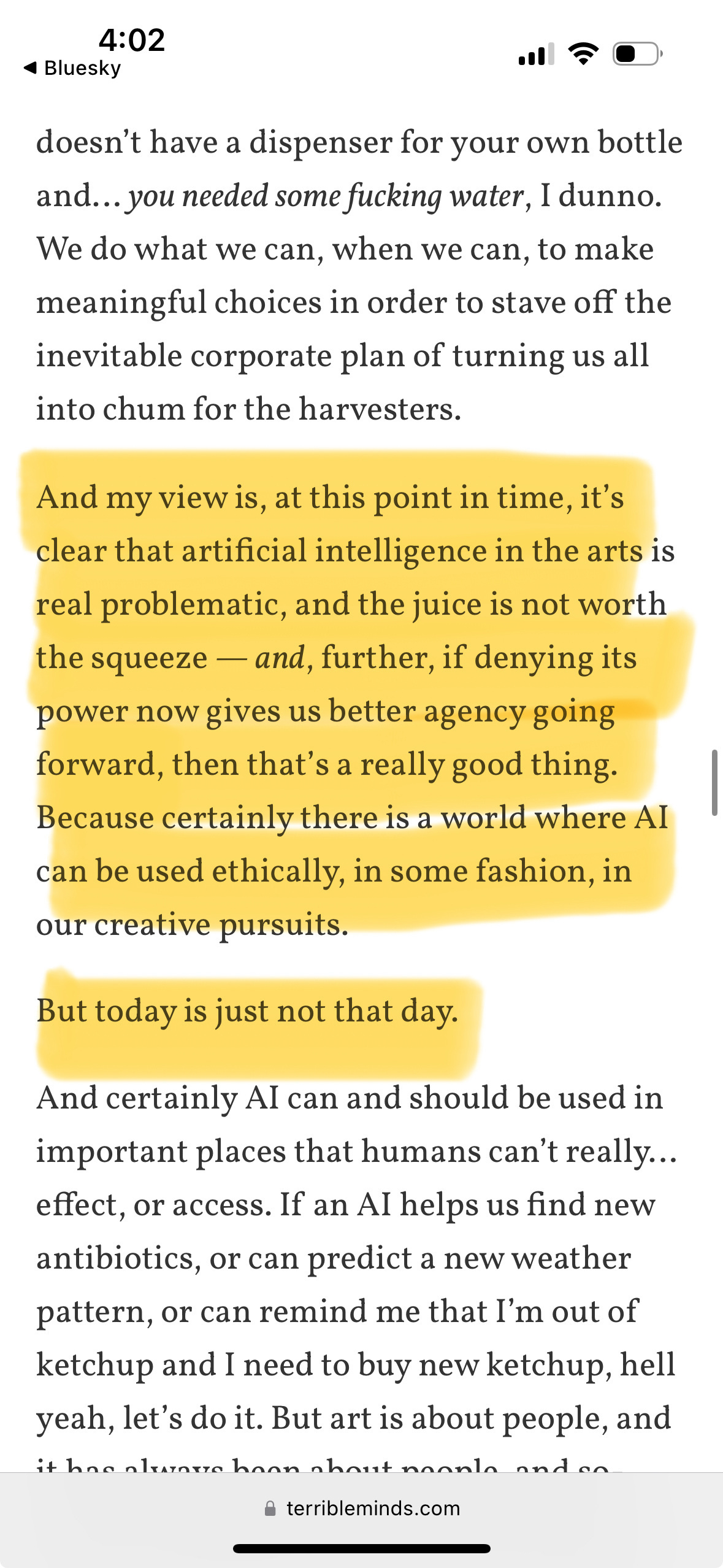
Matthew Panzarino joined the startup TipTop (posted about it on The Obsessor). A more modern, integrated approach to selling electronics seems neat, yet I couldn’t get through setup — it requires a Google sign-in and Gmail scraping. Alas, it’s a red flag and a very poor UX for non-Gmail folks.
The Verge went hard with this piece about the homogenization of websites, pointing the finger at both Google and web developers everywhere. Fairly right in its assertions, but if we stop thinking about the imprisonment from search engines… just imagine the possibilities.
Piles & Piles of Books

Came across this article via Tracy Darnell's blog, and what an essay! A masterstroke of reflection on books that connects right into my brain-thinking.
I have new books to read, upcoming books I want to read, old books to read, and only one lifetime
Sure, you could say this about any format of media. But there's something way more visceral about the physicality of books. You can put them on shelves, pile them up on a nightstand, or optimistically smash them into your luggage. There is so much diversity in typography, images, color, sizes, and formats for books that it's a truly joyful medium to collect.
But is collecting books a problem when, as Molly Templeton admits, you don't get around to reading many of them, and instead, "think about them. Appreciating them, you might say." She "can’t wait to get lost in it. Just, you know… later." There are, alas, too many other distractions and demands of one's time, and books sometimes don't make it into your day.
Anyway, she nails it with this:
Can there be comfort in the things you’re not reading? Can they be books that are just waiting for you to find their moment? Stories you need, just not yet, like snacks you put in your pocket for later, stored up for when you really, really need them? I’m pretty convinced this is the case. Haven’t you ever picked up a book months, years, decades after it came out and found it was exactly what you needed to read just then?
Yes, there can be a comfort in the books you aren't reading, or the books you have read years ago that you probably won't read again but just maybe you might want to read again to revisit those feelings you had about it, or rather to simply meet the vibe of it. Books are magical, transporting, beautiful objects that require your imagination and literacy skills to unlock the potential of. Thankfully I've got some space still to store more of them and my partner isn't going to cast me out of the house (yet).
Love this sketch card of a classic Tom Bihn Synik bag and the things you can pack into it. Comes slotted into one of the cardholders in their equally classic Nik’s Minimal Wallet. Both amazing products for everyday and traveling uses.
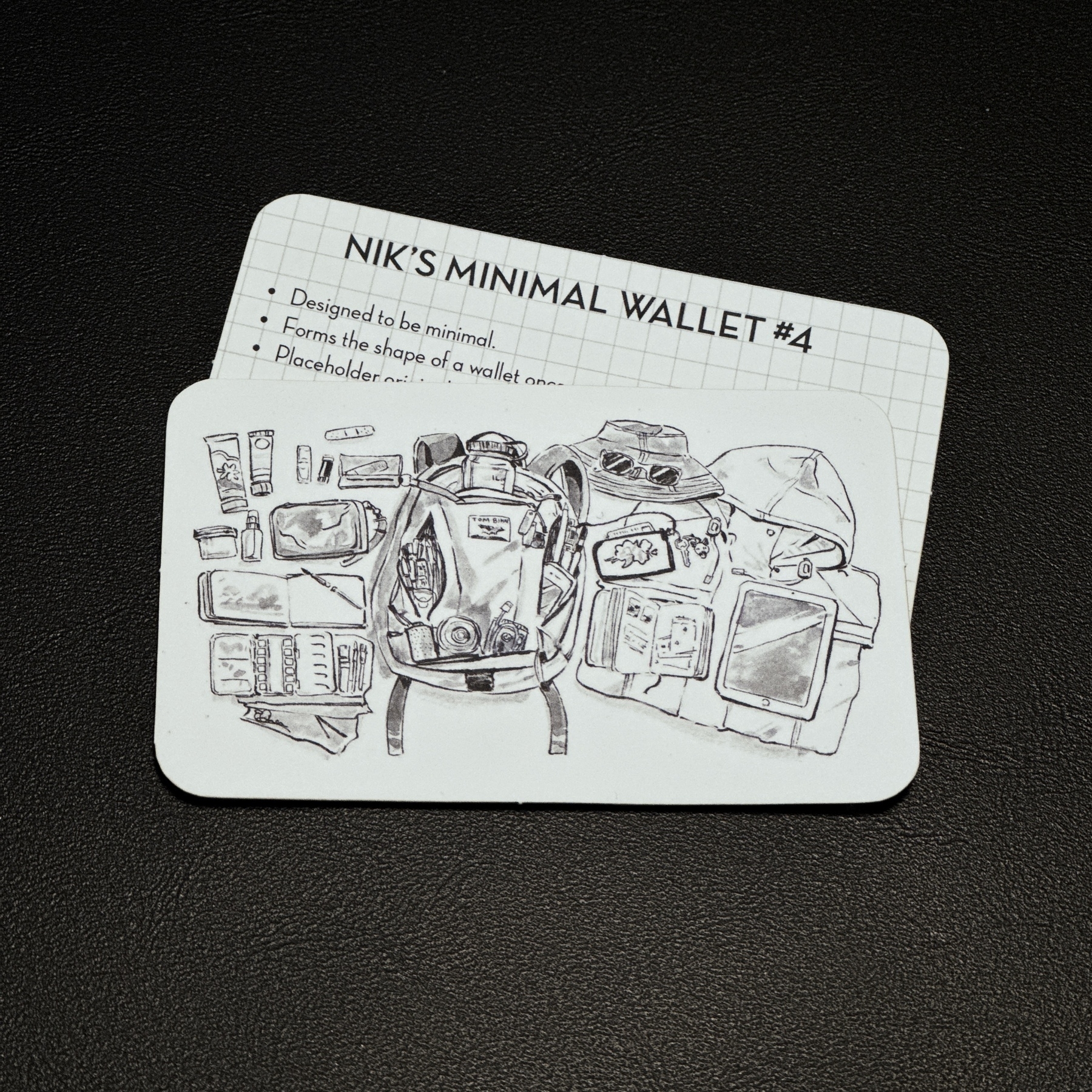
You hit a certain age… and you start to think more about aging. So I’ve been savoring any article like this one from the Guardian.
Overall ➔ good to know vocabulary peaks at 65, and happiness in our eighties.